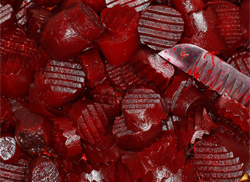
Fred Okemwa Omoke found a sure-fire way to make money from beetroot despite its taste which many find unpleasant.
British writer, editor, critic, poet and suffragist once wrote: “The true colour of life is the colour of the body, the colour of the covered red, the implicit and not explicit red of the living heart and the pulses. It is the modest colour of the unpublished blood.”
She could as well have been writing about beetroot the tap-root portion of the beet plant, whose healing and medicinal purposes are now appreciated globally. When Fred Okemwa Omoke retired from public service, he started growing bananas, a staple of his Kisii backyard, and paw-paws to make money and stay busy. He added beetroots, an important blood booster, mainly because his ageing parents were anaemic and used it regularly.
But Omoke, whose farm is in Ogembo, got a big break from an unlikely source. When medics from Ogembo sub-county hospital discovered that he had a plantation of beetroots, they referred anaemic patients to his home to buy the tubers.
“The demand motivated me to squeeze in more beetroot seedlings to my packed farm since they mature in just three months. I did my research and found that they could not stand the beetroot’s taste,” he said.
KIRDI gave me a lot of insights which guided me into settling on making bread jam paste from beetroot and ripe bananas as key ingredients, a decision that has turned my life around
But soon, there was a problem. Many of those who bought the beetroots did not return. To retain customers, he began blending the beetroot with ripe bananas. It worked, but only for a while. The new problem was how to preserve the concoction. Omoke abandoned the venture and instead sold bananas and beetroots to customers and advised them to blend themselves. This he did until 2014 when he mad a decision that changed everything.
While exhibiting his bananas at the Kisii Agricultural show, he met farmers from other counties who were adding value to their bananas by making products like flour, crisps, juice and yoghurt flavour. He was advised to visit the Kenya Industrial Research and Development Institute (KIRDI) with a clear plan of how he wanted to add value to his beetroot and bananas instead of selling them to his clients directly from the farm.
“KIRDI gave me a lot of insights that guided me settle for making bread jam paste from beetroot and ripe bananas as key ingredients, a decision that has turned my life around,” Omoke said. KIRDI experts carried out tests to ensure that his product had the right concentration of nutrients to serve not only as a sweet paste on bread, but as nutrition for anaemic patients. Other than the two key ingredients, he uses brown sugar, citric acid to give it a one-year shelf life and pectin to harden the jam. He is still doing tests on how to use cane syrup instead of brown sugar.
“This venture has earned me fame and recognition in our county and beyond. My farm has turned into a mini-research field for agriculture students countrywide and this has highly expanded my links and networks with various partners in the line of value-addition,” he says.
The Kenya Industrial Property Institute (KIPI) has cleared him to undertake full-fledged mass production of his product while Kenya Bureau of Standards (KeBS) has allowed him to sell it in all consumer outlets in the country.
